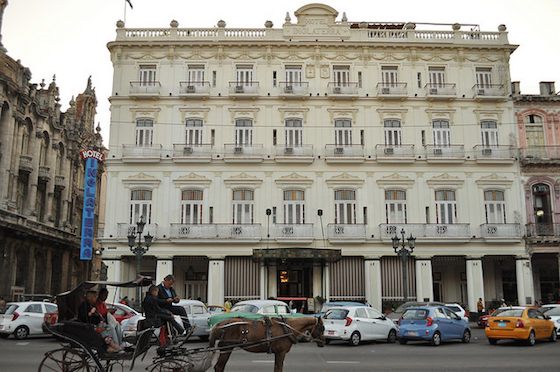U.S. President Donald Trump made good Friday on a campaign promise to roll back easements to the 56-year-old Cuban trade and travel embargo in 2014 by his predecessor, Barack Obama,. While not a full reversal, Trump’s executive order aims squarely at the potential of U.S. hotel companies hoping to gain a foothold on the island, which has seen a sharp increase in tourism – including growing numbers of Americans.
In a speech in Miami, Trump announced tightened restrictions on tourist travel, underscored the trade embargo and limits on financial transactions with the Cuban government, whose military arm controls hotel, resort and tourism development.
“With God’s help, a free Cuba is what we will soon achieve,” Trump said in remarks in Miami’s Little Havana neighborhood, in which he announced he was canceling the Obama administration’s “completely one-sided deal with Cuba,” which he called “terrible and misguided.”
The move was not unexpected. “We’re only here today because of what President Obama and the Cuban government didn’t do” when they had the chance in 2014, said John Kavulich, president of the U.S.-Cuba Trade and Economic Council: Executing Obama’s policies via executive orders rather than statutory changes in areas such as direct banking and imports meant that those actions could be easily reversed by an opposing administration.

Reversal of fortune
However, Trump’s announcement comes exactly a month after Cuba’s first international tourism and hotel development conference was held in Havana – attended by major hotel companies around the world, including major U.S. brands, which kept low profiles given trade restrictions.
Marriott President and CEO Arne Sorenson called the possibility of a reversal of progress “exceedingly disappointing.”
At this point, Marriott International has the most to lose, in the form of a management contract for a Four Points by Sheraton in Havana and another management agreement for Hotel Inglaterra in the pipeline.
But the longer-term stakes are much larger—and broader—given that the Cuban government’s strategic plan to improve infrastructure and build hotels, resorts and golf courses to attract and keep tourism.
“We have invested significant resources establishing a presence in Cuba, and with one hotel open and another in the pipeline, we have just begun our work creating opportunity and a more vibrant tourism sector on the island,” Sorenson said in a written statement. “More importantly, as Cuba moves to reform its economy in the post-Castro era, American businesses should be present to lead by example. We urge the Trump administration to recognize and utilize travel as a strategic tool in its efforts to improve relations with Cuba, allowing us to be part of a promising future, as opposed to reverting to the policies of the past.”
What it might mean
The new executive order would exclude U.S. companies from obtaining licenses with Cuban government-run entities such as Grupo Turismo Gaviota, Kavulich said. What’s unclear is the impact the exclusion would have on Marriott’s existing agreement or future agreements that other U.S. companies might make.
Short-term, it’s worth watching how much pressure the Trump administration gets from members of Congress and the business community, Kavulich said. Either way, the executive order “a result of a narrative that (Trump) created and he’s being responsive to, but it’s not about him having a passion changing the political and economic structure of Cuba,” he said.
Not quite ready
As a budding tourist destination, Cuba has significant issues to resolve: Before it can sustain an influx of tourists, whether it’s day-trippers from cruise ships, city explorers or resort vacationers, the country has to improve underdeveloped infrastructure, Internet access and financial systems to support tourists who expect ease of travel and payment – and the ability to communicate, in the moment, their whereabouts on social media.
“This is going to be a challenge for Cuba more so than for U.S. companies, because there isn’t a lot of U.S. activity,” Kavulich said, because Cuba could have used the looming entry of U.S. hospitality companies as “bait” to increase the competitive pool. But either way, “they’d rather have control than prosperity” – an issue that will become increasingly untenable with the rise of home-sharing service Airbnb, which entered the country in 2015.
Airbnb has been “a wonderful optic because it shows tolerance,” Kavulich said. “It’s enabled the Cuban government to rebuild a tiny fraction of its [housing] infrastructure at no cost to it.” He added, “At a certain level, they’re going to now start monitoring Airbnb more, taxing it more, because they’re now potentially taking substantive money away from government hotels. They are of interest until they’re too impactful.”
The clampdown doesn’t mean Americans will stop coming to the island, but rather restrict individual travel in favor of organized tour groups. And “as long as Americans can still come, it’s still OK,” said John Flood, president and CEO of Jakarta-based Archipelago International. The company earlier this year signed a management contract with Gaviota for a 430-room, new-build hotel in Varadero, Cuba.
“Havana, where most (Americans) want to go, isn’t quite ready yet with new hotels, infrastructure and Internet connections. The Cubans are working hard and doing a great job, but they still need three or four years to get up to speed where they can properly cater to such a big increase and the more demanding U.S. traveler, and ensure they become return visitors and not just disgruntled one-time visitors.” He added a prediction: “In four years, Trump will probably be gone, and hopefully the next president will bring back Obama’s good intentions and be more open to working with Cuba.”
